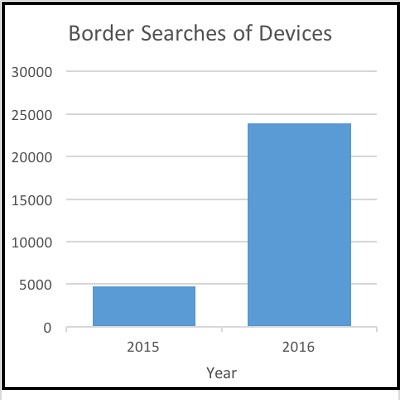
|
|

|
|
| April 25, 2024 |
|
Border agent searches of Americans’ cellphones spark lawsuit 
An advocacy group is suing the Department of Homeland Security to release details about every time U.S. border officers have searched travelers' electronic devices over the past five years.
According to documents filed Monday, the Knight First Amendment Institute has alleged that recent reporting by NBC News shows that U.S. border officers are acting unconstitutionally, violating both the First and Fourth amendments, by demanding that travelers present their cellphones for searches. In an investigation published earlier this month, NBC News examined 25 cases where American citizens said that customs officers at airports and border crossings demanded that they hand over their phones and passwords, or unlock them. The practice increased substantially between 2015 and 2016, according to U.S. officials. "Americans shouldn't have to permit this kind of fishing expedition into the most personal information that everyone carries around on their cell phones simply as a cost of traveling overseas," said Katie Fallow, a senior attorney at the Institute. "You want to have the right to speak freely and associate freely...without worrying about the government looking over your shoulder." The First Amendment Institute asked the Washington, D.C. federal District Court to force DHS to hand over data in a series of expedited Freedom of Information Act requests. Most of the people who told NBC News that their phones had been searched were Muslim, 23 out of 25. All of them are U.S. citizens with U.S. passports. "We need the information to assess whether their actions are justified," said Fallow. A spokesperson for Customs and Border Protection, which is part of DHS and conducts the searches, told NBC News that CBP "firmly denies any accusations of racially profiling travelers based on nationality, race, sex, religion, faith, or spiritual beliefs." CBP said any increase in searches occurred because of a change in threat information. "Over the past few years, CBP has adapted and adjusted to align with current threat information, which is based on intelligence. As the threat landscape changes, so does CBP." Earlier this month, the Electronic Freedom Foundation filed a brief to the Fourth Circuit court, arguing the border officers should need a warrant before searching travelers' cell phones. Sophia Cope, an attorney at EFF, said the cellphone searches "implicate all Americans. … They might start to do that with Muslims, but ultimately they're moving toward being able to do that [digital search] with all Americans coming home from abroad." A spokesperson for DHS said that "as a matter of policy, DHS does not comment on pending litigation." CBP also declined to comment on the suit. (Source: NBC News) Story Date: March 29, 2017
|